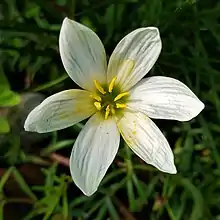Zephyranthes candida
Zephyranthes candida, with common names that include autumn zephyrlily,[2] white windflower,[3] white rain lily,[4] and Peruvian swamp lily,[5] is a species of rain lily native to South America including Argentina, Uruguay, Paraguay, and Brazil. The species is widely cultivated as an ornamental and reportedly naturalized in many places (South Africa, the Indian subcontinent, Zimbabwe, Seychelles, central and southern China, Korea, Nansei-shoto (Ryukyu Islands), Bhutan, Solomon Islands, Queensland, Nauru, Tonga, Society Islands, Mariana Islands, southeastern United States (from Texas to North Carolina), the Lesser Antilles, and Peru).[6][7]
| Zephyranthes candida | |
|---|---|
 | |
| Scientific classification | |
| Kingdom: | Plantae |
| Clade: | Tracheophytes |
| Clade: | Angiosperms |
| Clade: | Monocots |
| Order: | Asparagales |
| Family: | Amaryllidaceae |
| Subfamily: | Amaryllidoideae |
| Genus: | Zephyranthes |
| Species: | Z. candida |
| Binomial name | |
| Zephyranthes candida | |
| Synonyms[1] | |
| |
Leaves are a deep glossy green and measure 3 mm wide. Flowers, which bud late in August (when propagated in the Northern Hemisphere) at first resemble a new leaf, but emerge from their papery sheaves to a stunning whiteness; they are erect in perianth white and sometimes pinkish abaxially. The leaf-like bract is 1.8 to 4 cm. They grow best in full sun to part shade and require a medium wet soil. Propagation is done by dividing bulbs or offsets and from seed.[8][9][10][11]
Zephyranthes candida was first described by John Lindley in 1823 as Amaryllis candida.[9] It was transferred to its current genus in 1826 by William Herbert.[8][3] Other common names of Zephyranthes candida include August rain lily, white zephyr lily, white fairy lily, white rain lily, and autumn zephyr lily.
Cultivation
Hardiness: USDA zones 7-10.
Chemical constituents
It contains lycorine, nerinine, haemanthamine, tazettine, haemanthidine, zephyranthine.[12]
See also
References
- The Plant List
- "Zephyranthes candida". Natural Resources Conservation Service PLANTS Database. USDA. Retrieved 9 August 2015.
- "Zephyranthes candida". Australian Plant Name Index (APNI), IBIS database. Centre for Plant Biodiversity Research, Australian Government.
- "Zephyranthes candida". Germplasm Resources Information Network (GRIN). Agricultural Research Service (ARS), United States Department of Agriculture (USDA).
- "Royal Horticultural Society: Find a Plant". Retrieved 20 December 2014.
- Kew World Checklist of Selected Plant Families
- Biota of North American Program
- Herbert, William. 1826. Botanical Magazine 53: pl. 2607, Zephyranthes candida
- Lindley, John. 1823. Botanical Register 9: pl. 724, Amaryllis candida
- Sasaki, Shun-ichi. 1928. List of Plants of Formosa 112, as Atamosco candida
- Rafinesque, Constantine Samuel. 1838. Flora Telluriana 4: 10. as Plectronema candida
- "Katoch D and Singh B, Med Aromat Plants" (PDF).
External links
| Wikimedia Commons has media related to Zephyranthes candida. |